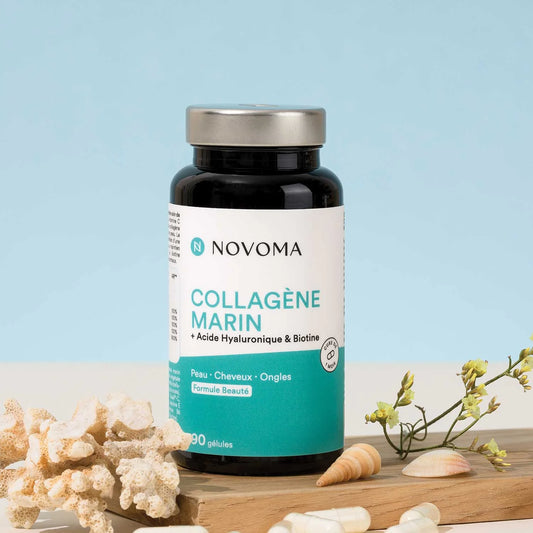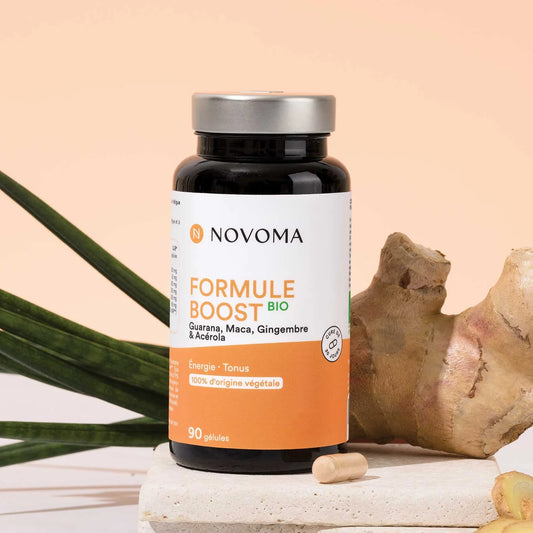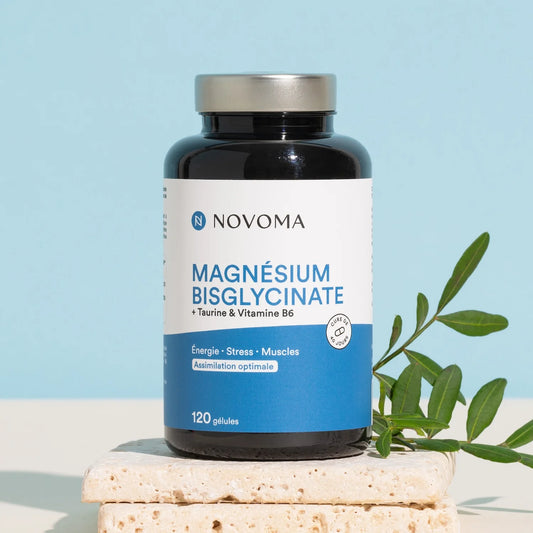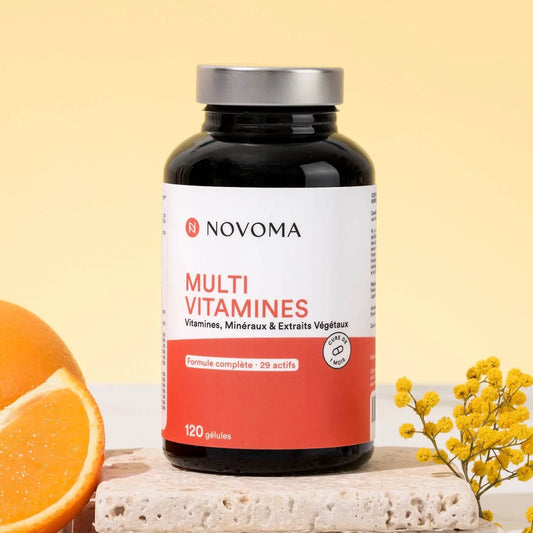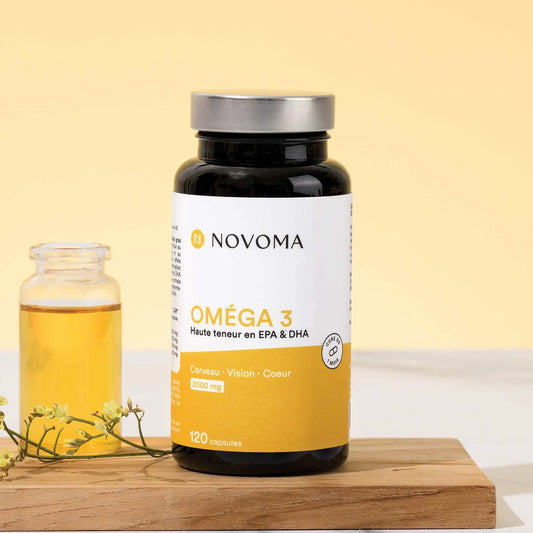
Vitamin D and Immunity: So What’s the Connection?
Summary
Vitamin D is THE nutrient that is omnipresent in the news and on the shelves of pharmacies as soon as winter sets in and seems like the essential ingredient for our general well-being.
But do you really know its fields of action? Often associated with good bone function, vitamin D plays a much broader and more complex role in the body, particularly for the immune system.
Contrary to what one might think, Vitamin D intake is not limited to an optimal duration of exposure to light, nor to the consumption of certain foods!
👉 Proof of this is the Esteban study conducted between 2014 and 2016 by Santé Publique France, reports that only 1 in 4 adults and 3 in 10 children reach an adequate threshold of vitamin D. The prevalence of proven vitamin D deficiencies would concern nearly 7% of adults and 13% of adolescents, with a notable increase in men aged 55-74, less aware of bone fragility than women of the same age.
Our team has not yet managed to encapsulate the sun (although! 😉) , but we have combed the subject for you! Follow the guide, you will know everything about the link between Vitamin D and immunity, its functions for the body and the importance of appropriate supplementation ... all year round!
How is Vitamin D essential for the body?
Vitamin D is like a conductor for the body. It regulates many essential biological processes, including ensuring proper bone function.
Let's take a closer look.
The Proven Benefits of Vitamin D
👉 It contributes to the normal absorption and use of calcium and phosphorus, two essential minerals for the maintenance of normal bones and teeth ;
👉 It contributes to normal calcemia, fundamental for many bodily functions ;
👉 It contributes to the maintenance of normal muscle function, which is particularly important for reducing the risk of falls and fractures in the elderly ;
👉 It contributes to the normal functioning of the immune system, thus helping the body to defend itself against unwanted agents ;
👉 It plays a role in the process of cell division, which is vital for maintaining normal cell and tissue function .
Our bones are therefore far from being the only ones to thank Vitamin D!
We recommend you
Vitamin D3
Highly bioavailable microencapsulated Vitamin D3V®.
- ✅ Natural and bioavailable form
- ✅ Plant origin (algae)
- ✅ 2000 IU for 2 capsules
- ✅ 2 months of treatment
Are natural sources of vitamin D sufficient?
Who hasn't heard that sunlight is our main source of Vitamin D? It's true, in part!
But between days indoors, harsh winters and darker skin that tends to filter out UV rays, it can be difficult to get enough vitamin D to ensure optimal immunity.

Production through the skin: the invisible virtues of the sun
Vitamin D is naturally synthesized by the skin as soon as it is exposed to the sun's UVB rays.
☀️ Just 15 to 30 minutes of direct exposure, without sun protection, is enough for the body to produce a significant amount of Vitamin D.
Easy, right? Well, not so much! There are several factors to consider: season, time of day, latitude, and even skin color.
In winter, UVB rays are less intense and in some regions are simply not strong enough to trigger the production of Vitamin D (in Nordic countries for example). Not to mention the use of sun protection (although relevant), which can slow down the production of Vitamin D.
Result? Even if you spend an entire afternoon in the sun, your production may not be sufficient!
The Limits of Skin Production: A Tale of Compromises
As explained previously, several factors slow down the natural production of Vitamin D.
👉 Dark skin is regularly affected by a lack of Vitamin D, because melanin acts as a natural barrier against UV rays;
👉 People of a certain age have mature skin that synthesizes this vitamin less efficiently;
👉 The use of sunscreens, although essential to prevent skin damage, further complicates the equation.
In short, if you live in a temperate climate or are in the higher risk categories, it is almost impossible to rely solely on the sun...
Food: rich sources, but insufficient
If the sun is lacking, diet will be your ally to increase your vitamin D intake and benefit from its benefits on immunity.
➡️ Oily fish (salmon, mackerel, herring, sardines), egg yolk, certain mushrooms (chanterelles, porcini mushrooms and morels), fortified dairy products, butters and margarines, offal (especially liver).
However, even by consuming foods rich in Vitamin D regularly, it is difficult to cover daily requirements.
To give you an idea, you would need to eat 100 grams of salmon every day to meet your Vitamin D needs!

Why is Vitamin D supplementation essential?
Given these various limitations, vitamin D supplementation is often essential, especially during the winter months. That said, this does not prevent you from going out regularly in the sun and taking care of your diet!
A dietary supplement is there to help the body maintain optimal levels, and regarding Vitamin D, to benefit from all its benefits on immunity, especially in winter.
But what are the real benefits of a Vitamin D supplement?
Ensure a constant supply even in the absence of exposure to the sun or a diet too low in Vitamin D, and thus:
✔️ Contribute to the proper functioning of the immune system;
✔️ Ensure the maintenance of normal muscle function, bone structure and calcemia;
✔️ Improve mood through its action on the regulation of serotonin;
✔️ Maintain normal teeth;
✔️ Support cell division processes.
As you will have understood, a small capsule of Vitamin D every day could be the basic ally to get through the seasons in great shape!
The Novoma team has worked to formulate a Vitamin D3 that meets your expectations:
Our 100% natural and highly assimilable D3V® labeled vitamin D3 provides 2000 IU of vitamin D3, the ideal dosage to guarantee effects on immune defenses, bones, and muscle function.
And you talk about it better than us! 🙌
When and how to take Vitamin D?
If you are now as convinced as we are of the benefits of vitamin D supplementation for immunity, let's get down to business and learn how to integrate it into your daily life.
Ideal moments: in synergy with lipids
Vitamin D is fat-soluble, meaning it dissolves in fat. To maximize its absorption, it is recommended to take it with a meal containing fat, such as nuts, olive oil, or avocado.
Daily intake, rather than one-off, is also recommended to maintain constant levels in the body!
✅ Our advice : depending on the period of your treatment and your needs, consider combining it with Vitamin C or Magnesium Bisglycinate, an optimal trio!
Appropriate dosages: neither too much nor too little
Regarding dosages, they vary according to age, level of sun exposure and individual needs. To be sure not to make a mistake, follow the official recommendations or seek advice from your doctor.
💡Excess Vitamin D can also have unwanted effects, it is better to make sure to stay in the optimal zone!
For whom?
The groups of people most at risk of vitamin D deficiency are children, the elderly, people with dark skin, and those who spend a lot of time indoors.
If you recognize yourself in one of these groups, it may be time to think about supplementation! ☺️
As you will have understood, Vitamin D is not just the “sunshine vitamin” : it is a major player in your well-being and top immunity. Supplementation comes as a support to counterbalance the frequent deficiencies concerning Vitamin D!







